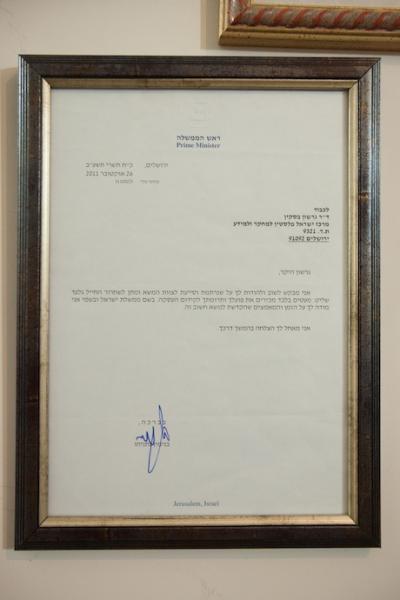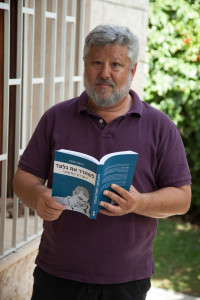Gershon Baskin claims that to overcome the lack of mutual trust, the only way is secret back-channel talks. Netanyahu cannot go into a real negotiation with the Palestinians and keep his government. Abbas can’t go into a serious negotiation with Israelis and keep stability on his own side.
Are there any Israelis and Palestinians who still believe in peace between them? Yes, there are, but they are implementing a different “process”. The following stories are of coexistence.
The atmosphere was hectic and festive, like a bazaar full of colours and scents when Israel and the PLO signed the Oslo Accords, in September 1993. These agreements were hailed almost as a revolution by negotiators on both sides, while critics dismissed them as, “a Palestinian surrender”.I was there, at that time, in the land that some people venerate as holy and others fear as a hell on earth. One of the most memorable scenes was of schoolchildren, their backpacks decorated with a national (and illegal) flag, offering flowers to bewildered Israeli soldiers.
Twenty years later I went back to evaluate the so-called “peace process”. Is it alive or dead? Still capable of being reanimated? Or is it buried along with a “two-state solution”? Oslo was a deal between a strong Israel, and a very weak PLO. It was a pact bonding a general, Yitzhak Rabin, who had conquered the West Bank and Gaza Strip in the 1967 war, and a guerrilla leader, Yasser Arafat, who had lost Arab support after siding with Saddam Hussein when Iraq invaded Kuwait in 1990.
Going back, one of the immediately striking features is the large concentration of Jewish settlements (about 40% of the West Bank where the number of settlers has increased from 105,000 to more than 550,000, including those in East Jerusalem) – Rabin did not freeze construction, and his successors are still expanding them. There are also increasing numbers of military checkpoints as well as a 441 miles “separation fence” also vilified as the “Apartheid wall”. This is a barrier which is taking over agricultural land and dividing villages. However I got the feeling that the majority of Israelis don’t even notice the occupation.
So, with this gloomy picture, 20 years after Oslo, are there any Israelis and Palestinians who still believe in peace? Yes, there are, but they are implementing a different “process”. The following stories are of coexistence – an idea and a practice repudiated by those who defend “co-resistance” against “normalization”, a concept adopted in 2007 by the Boycott, Divestment and Sanctions (BDS) movement, as “colonization of the mind whereby the oppressed subject comes to believe that the oppressor’s reality is the only ‘normal’ reality that must be subscribed to, and that the oppression is a fact of life that must be coped with.”
Gershon Baskin and IPCRI
To Gershon Baskin, probably the most famous peacemaker in Israel, who became even more famous after he negotiated the release of soldier Gilad Shalit, kidnapped by Hamas,
“Oslo was an historical agreement, but not in terms of how to make peace; the process was well intentioned – but very naive.”
Why?
“Because Oslo assumed that in order to resolve the conflict, we had to develop trust beforehand”,
clarified the founder of IPCRI (Israel-Palestine Center for Research and Information), of which he was co-Director from 1988 until December 2011. Now he is co-chairman of the board.
“That was a nice assumption, but no one ever bothered to stop and think what happens if the trust is not created. What we ended up with was an interim agreement with no final resolution. And that interim agreement only increased opposition to the deal, because it did not confront, at any point, the real issues that bring conflict…That’s essentially what happened to Oslo: cooperation failed, trust wasn’t built and violence increased”
Baskin summed up, as he received me in his house, in Jerusalem, full of African wood sculptures, musical instruments, books and papers dispersed from the living room to the basement (and bunker). Here, he exhibits on a wall a framed letter that he believes was “reluctantly sent” by Prime Minister Benyamin Netanyahu, thanking him for freeing Shalit.

From 2006 to 2012, Baskin made every effort to free Shalit. After initially refusing the conditions imposed by Hamas (releasing hundreds of Palestinian prisoners), Benyamin Netanyahu accepted them 5 years later. Speculating that the prime minister was forced to make a deal to distract attention from a big social protest movement, “What a waste of time”, Baskin said. In return for his efforts, the IPCRI co-founder received a very short letter with a few words of gratitude from the authorities.
“The demand for Palestinians to fight against terrorism gave way to a sense that they were protecting the continuation of the occupation, while Israel was building more settlements”, Baskin analyzed. “Rabin was assassinated [in 1995] and the new elected Prime Minister, Benyamin Netanyahu, was not committed to the process. In fact, he was opposed to it. And the conflict exploded out of control.”
Baskin looks, nowadays, relatively more confident:
“As one of the last founding leaders of the Palestinian National Movement, Mahmoud Abbas is perhaps one of the last leaders who can sign an agreement. On the Israeli side, Benyamin Netanyahu is the person we need to make the agreement, because only his right wing camp can make the necessary compromises and not divide the Israeli public in half. “
To overcome the lack of mutual trust, Baskin advises: “The only way is secret back-channel talks. Netanyahu cannot go into a real negotiation with the Palestinians and keep his government. Abbas can’t go into a serious negotiation with Israelis and keep stability on his own side. We need the Americans – not at the beginning of the process but only at the end; to close the deal, bridge the gaps, give guarantees and put the final touches on an agreement.”
Excerpted from https://www.opendemocracy.net/margarida-santos-lopes-udi-goren/“oslo-peace”-twenty-years-on
Complete article at
http://margaridasantoslopes.com/2013/09/15/oslo-peace-twenty-years-on/




